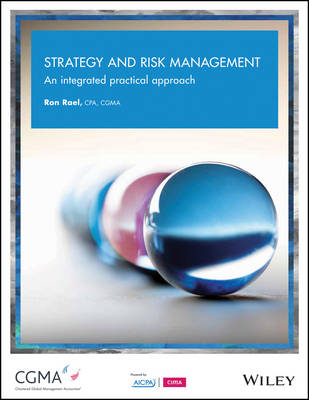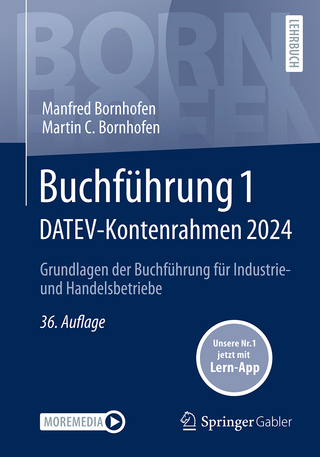
Strategy and Risk Management
American Institute of Certified Public Accountants (Verlag)
978-1-940235-21-9 (ISBN)
Employees make dozens of day-to-day decisions and any one of them could come back to haunt you, even when the decision does not seem to have hidden or unknown ramifications. That is why your organisation must have a protocol in place for identifying and mitigating all major business risks long before it is needed. At the strategic level, risk management and strategic management are intertwined. Using this book, learn how to apply powerful tools and approaches to make your planning processes more effective and flexible and build a set of decision-making processes based on plain language. Author, Ron Rael, uses quality concepts/language (TQM & Six Sigma) to define the Enterprise Risk Management (ERM) process and value of prevention, while showing how these elements are both necessary and highly desired in an organisation s strategic decision-making. ERM extends to your everyday business decisions because employees take actions and make daily choices that could have a detrimental effect on your profits and business s longevity and future.
This book will * provide a best practices view on the latest developments in ERM * deliver how-to guidance on developing ERM processes at the enterprise and department levels * facilitate enterprise-wide ERM participation via practical information and examples * deliver cross-functional management and implementation of ERM
Ron Rael, CPA, CGMA, is a thought leader for the CPA profession on leadership and CFO/Controllership topics. He is the CEO of the High Road Institute, a leadership development organization. Ron has authored content on topics such as budgeting, accountability, governance, risk management, and strategic planning. He has coached more than 10,000 accounting professionals in organizations and leadership teams throughout the United States and Canada. Ron s industry experience comes from working in two large corporations, as well as from leading accounting teams in numerous closely held businesses.
Introduction xi Chapter 1 Introduction to Enterprise Risk Management 1 Who This Book Is for 1 Success Requires Commitment to Risk Management 2 Risk Management Defi ned 3 Stewardship and Risk Management 3 Cost and Risk Management 4 The Cost of Success 5 The Cost of Failure 5 Summary of Risk Management Watching for the Potholes 6 Your Action Plan 6 Chapter 2 The WHAT of Risk Management 7 What Risk Management Is 7 The Born (Entrepreneur) Incident 7 What Risk Management Is Not 8 Risk Taking Versus Risk Management 8 Risk Taking Is Necessary for Survival 9 Risk Management Is Necessary for Success and Growth 9 What Risk Is 11 Risk Can Be Seen from Two Views 11 Risk Can Be Unpredictable 12 Your Personal Risk Appetite 12 Risk Management Tool One Personal Risk Spectrum 12 What a Risk Management Programme Is 14 You Already Manage Risk 14 Preview of a Risk Management Structure 15 Cost of a Risk Management Programme 17 Cost Awareness That Risk Exists 18 Cost Finding Appropriate Balance 19 Cost Measuring Your Exposure 19 Cost Setting Appropriate Goals 20 Cost Willingness to Alter Your Plans 20 Cost Embracing the Pains of Change 20 The Catch-22 Syndrome of Risk Management 20 Catch 1 21 Catch 2 21 Risk Taking Is a Paradox 21 Back to PJI 22 Onward 23 Your Action Plan 23 Chapter 3 WHY Is Risk Management Important to Us? 25 Reasons Why Formal Risk Management Is Vital to Success 25 Reason 1 25 Reason 2 25 Reasons to Care about Formal Risk Management 26 Not Just Risk Avoidance 26 It s a Small (Appliance) World 26 Why Peril Awareness Is a Group E ort 28 Why Risk Management Is a Leadership Responsibility 29 Desire for Innovation and Creativity 30 Need for Fraud Prevention and Detection or Proper Governance 30 Need Adequate Checks and Balances 30 Desire to Maximise Profi ts 31 Need for Good Stewardship of Corporate Assets 31 Ten Ways ERM Can Make an Impact 31 Onward 32 Your Action Plan 33 Chapter 4 WHICH Risk s Do We Need to Be Concerned about? 35 Enterprise Risk Management Step One Obtain Consensus on Allowable Risk 36 Risk Management Tool Two: Process for Gaining Consensus on What Risk Looks Like 36 Why Defining Risk Is Necessary in Enterprise Risk Management 38 Evaluating Risk 39 Immediacy of Risk 39 Size of Risk 40 Impact of Risk 41 Scope of Risk 41 Back to PJI 42 How to Make an Internal Strategic Risk Assessment 42 Risk Management Tool Three Strategic Risk Assessment 42 What Strategic Risk Management Is 43 Three Examples of Tools to Assess Risk 44 Risk Management Tool Four Risk Tolerance Questionnaire 44 Risk Management Tool Five Critical Risk Questionnaire 44 Risk Management Tool Six Critical Risk Path 45 Three Case Studies 45 Case Study: The Risk in Giving Incentives to Certain Employees 45 Case Study: The Risk of Doing Business in a Third-World Country 47 Case Study: The Risk of New Technology 48 Onward 50 Your Action Plan 50 Chapter 5 WHEN Is It A ppropriate to Plan for Risk ? 51 Plan for Risk before It Happens 51 Mark s Failure to Anticipate Risk 51 Mark s Pitfall 52 Back to PJI 52 ERM Step Two Seek Out the Global Sources of Risk 53 Strategic Objectives and ERM 54 Relationship of Strategic Planning and Risk Management 55 Assessing Your Strategic Risk 57 Operational Objectives and ERM 58 Operational Risk 58 Mitigating Operational Risk 59 When to Apply Risk Management 60 Daily, Monthly and Annual Goals 60 New Initiatives 60 Everyday Business Decisions 60 Opportunities and Threats 61 Risk Assessing When Scenario Planning 62 Tool for Measuring Risk 64 Risk Management Tool Seven Risk and Opportunity Measurement and Management Strategy Grid 64 Case Study: The Opportunity to Invest 69 Case Study: The Risk of Losing Qualifi ed Talent 70 Case Study: Avoiding Termination Blowback 70 Lessons from the Case Studies 70 Onward 70 Action Plan 71 Chapter 6 WHERE Do Our Efforts Need to Be? 73 Sources of Jeopardy 73 Harry 74 Holistic Approach 75 ERM Step Three Analyse the Ability of Your Organisation to Handle Risk 75 Risk Management Tool Eight Culture Assessment 76 Embedded in the Cultural Fabric 76 What Is Culture? 77 How a Culture Story Is Developed 78 Visible Clues about Risk in Your Cultural Norms 78 Culture Must Never Be Downplayed 79 Determining Your Culture s View of Risk Taking 80 Risk Management Tool Nine Assessment of a Balanced Culture 81 Barriers to ERM Implementation 82 Obstacle One: Perceived Cost in Dollars and Time 82 Obstacle Two: Denial That ERM Is Necessary 82 Obstacle Three: Leaders Resistance 83 Obstacle Four: Employee Attitudes 83 Ways to Integrate ERM into Your Culture 84 Bring Your People Resources Together 84 Ensure Employee Acceptance through Training 84 Build Enthusiasm 85 Make it a Bottom-Line Issue 85 Risk Management Tool Ten Responsibility Statement 86 Teach Managers about Risk Management 86 Five ERM Actions for Immediate Implementation 87 Risk Management Tool Eleven SLOT Analysis 88 SLOT Versus SWOT 89 Your External Threats and Risk Management 89 Your Opportunities and Risk Management 89 Onward 90 Your Action Plan 90 Chapter 7 WHO Needs to Be Involved? 93 Risk Management Is a Team E ort 95 CRO 96 Risk Management Team 97 Board of Directors 98 Oversight Group in Small Organisations 98 Finance s Role in ERM 100 Insurance s Role in Risk Management 101 Insurance Does Not Always Reduce Exposure 102 Insurance s Inadequacy 102 ERM Step Four: Minimise Exposure to Risk 103 Look for Risk during Times of Success 104 Look for Risk in Your Vulnerable and Hidden Areas 104 Look for Risk in Your Timelines 105 Integrate ERM Goals into Existing Infrastructure 105 Budgeting Process 105 Reporting and Feedback Process 105 Goals and Measurements System 106 Prioritisation Process 106 Project Development and Funding Process 106 Minimise Internal Risk of Unethical Employee Behaviour 106 Risk and POLR 107 Setting the Expectation for Ethical Behaviours 107 Unreasonable Policies Increase Ethics Risk108 Unreasonable Expectations Increase Ethics Risk 108 Incentives Increase Ethics Risk 109 Internal Pressures Increase Ethics Risk 110 Risk from Fraud and Employee Abuses 110 Two Tools to Analyse and Reduce Exposure to Ethics Risk 112 Risk Management Tool Twelve The Five Whys 112 Risk Management Tool Thirteen Establish Contingency Funds 115 Back to PJI 115 Onward 116 Your Action Plan 116 Chapter 8 HOW Do We Conduct Enterprise Risk Management? 117 Process for the Leadership Body to Implement Risk Management 119 Checklist for Implementing Risk Management 119 Minimum Elements to Establish Risk Awareness 122 Starting to Implement ERM 123 ERM Step Five: Recover Quickly from the Negative Impacts of the Risk 124 Empower Employees to Act 125 Match Authority with Responsibility 126 Five Tools to Help Clarify Accountability and Empower Employees to Act 128 Risk Management Tool Fourteen Risk Authority and Responsibility Chart 128 Risk Management Tool Fifteen Formalised Action Plan 130 Risk Management Tool Sixteen Formalised Action Plan Summary 133 Risk Management Tool Seventeen Pitfall Analysis 135 Risk Management Tool Eighteen Controllable, Negotiable and Given Analysis 137 Onward 140 Your Action Plan 140 Chapter 9 What Happens NEXT? 143 Reconciling Dierent Views of Risk 143 Teri and Kris 143 Risk Management Tool Nineteen Criteria Checkerboard 145 ERM Step Five and One-Half: Learn Something (So You Can Accept Even More Risk with Confidence) 148 Evaluating Your ERM Eorts 149 Interpreting Results 150 Tracking Process Output Versus Reality 150 Scenario Planning Again 151 Learning Lessons 151 Risk Management Tool Twenty Plus/Delta Analysis 151 The Risk Audit 153 Ongoing Protection 155 Lessons Learned 155 Onward 156 End of the Line 156 Five and One-Half Myths of ERM 157 ERM Tool Kit 157 Your Action Plan 157 Chapter 10 Epilogue 159 Justin 159 Paul 159 PJI International 159 The Future Is Bright 160 You and Your Organisation 160 Case Study: The Hornet s Nest 161 Onward 163 Appendix A High Road Institute s Process for Implementing an Effective Risk Management Programme 165 Appendix B What Happened in 2007? 199 Appendix C Enterprise Risk Management 211
| Erscheinungsdatum | 15.12.2016 |
|---|---|
| Verlagsort | NC |
| Sprache | englisch |
| Maße | 218 x 280 mm |
| Gewicht | 608 g |
| Themenwelt | Wirtschaft ► Betriebswirtschaft / Management ► Rechnungswesen / Bilanzen |
| Wirtschaft ► Betriebswirtschaft / Management ► Unternehmensführung / Management | |
| ISBN-10 | 1-940235-21-9 / 1940235219 |
| ISBN-13 | 978-1-940235-21-9 / 9781940235219 |
| Zustand | Neuware |
| Haben Sie eine Frage zum Produkt? |
aus dem Bereich


